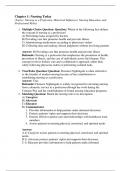Chapter 1: Nursing Today
(Topics: Nursing as a Profession, Historical Influences, Nursing Education, and
Professional Roles)
1. Multiple-Choice Question: Question: Which of the following best defines
the concept of nursing as a profession?
A) Performing tasks assigned by doctors
B) Providing care that promotes health and prevents illness
C) Administering medications according to physician's orders
D) Collecting data and making clinical judgments without involving patients
Answer: B) Providing care that promotes health and prevents illness
Rationale: Nursing is a profession that emphasizes the promotion of health,
prevention of illness, and the care of individuals across the lifespan. This
concept involves holistic care and a collaborative approach, rather than
solely following physician orders or performing isolated tasks.
2. True/False Question: Question: Florence Nightingale is often referred to
as the founder of modern nursing because of her contributions to
establishing nursing as a profession.
Answer: True
Rationale: Florence Nightingale is widely recognized for elevating nursing
from a domestic service to a profession through her work during the
Crimean War and her establishment of formal nursing education programs.
3. Matching Question: Match the nursing role to its description:
A) Caregiver
B) Advocate
C) Educator
D) Communicator
1. Provides information to help patients make informed decisions
2. Protects patients' rights and supports their decisions
3. Ensures effective patient care and relationships with healthcare team
members
4. Assists patients in meeting physical, emotional, and spiritual needs
Answer:
A-4) Caregiver assists patients in meeting physical, emotional, and spiritual
needs.
B-2) Advocate protects patients' rights and supports their decisions.
C-1) Educator provides information to help patients make informed
, decisions.
D-3) Communicator ensures effective patient care and relationships with
healthcare team members.
Rationale: Each of these roles represents core functions of nursing, where
the nurse engages in advocacy, education, caregiving, and communication as
essential components of patient care.
4. Short-Answer Question: Question: What are the key historical events that
shaped the development of modern nursing as a profession?
Answer: Key historical events include the establishment of formal nursing
education by Florence Nightingale, nursing's role during the Crimean War
and other wars (e.g., World War I and II), the rise of public health nursing,
and the expansion of nursing science and research in the 20th century.
Rationale: Understanding historical milestones helps nurses appreciate the
evolution of the profession and its foundations in education, research, and
service during key historical periods.
Chapter 1: Nursing Today
1. Multiple-Choice Question:
Question: Which of the following is NOT considered a primary focus of nursing?
A) Health promotion
B) Illness prevention
C) Disease diagnosis
D) Care of the dying
Answer: C) Disease diagnosis
Rationale: While nursing involves assessments and recognizing signs and
symptoms of diseases, the formal diagnosis of diseases is the responsibility of
physicians or other advanced practice providers. Nursing primarily focuses on
health promotion, illness prevention, and providing care throughout life stages.
2. Multiple-Choice Question:
Question: What is the primary role of a nurse when acting as a patient advocate?
A) Directing the patient to follow medical orders
B) Informing patients of their rights and ensuring they are upheld
,C) Providing technical nursing care
D) Prescribing medications for the patient
Answer: B) Informing patients of their rights and ensuring they are upheld
Rationale: The nurse as an advocate supports the patient's autonomy, ensures their
rights are respected, and helps navigate the healthcare system to meet their needs.
3. True/False Question:
Question: The role of the professional nurse is to work independently from other
healthcare professionals in planning and delivering patient care.
Answer: False
Rationale: Nurses collaborate with other healthcare professionals to provide
holistic and comprehensive care. Interdisciplinary teamwork is a key component of
modern healthcare delivery.
4. True/False Question:
Question: The primary purpose of nursing education is to prepare students to
perform technical tasks accurately.
Answer: False
Rationale: Nursing education prepares students to provide comprehensive care,
which includes critical thinking, communication, and understanding ethical
responsibilities, beyond just performing technical tasks.
5. Matching Question:
Match the nursing trend to its description:
A) Evidence-Based Practice (EBP)
B) Autonomy
C) Nursing Informatics
D) Patient-Centered Care
1. Use of research to guide clinical decision-making
2. Ability to initiate independent nursing interventions
3. Focuses on the patient's needs, preferences, and values
4. Use of information and technology in nursing practice
, Answer:
A-1) Evidence-Based Practice uses research to guide clinical decision-making.
B-2) Autonomy involves the ability to initiate independent nursing interventions.
C-4) Nursing Informatics refers to using information and technology in nursing
practice.
D-3) Patient-Centered Care focuses on the patient's needs, preferences, and values.
6. Short-Answer Question:
Question: Describe the concept of accountability in nursing.
Answer: Accountability means that nurses are responsible for their actions and the
outcomes of those actions, ensuring safe, ethical, and evidence-based care for
patients.
Rationale: Accountability is fundamental in nursing practice, emphasizing
responsibility for one's decisions and care delivery.
7. Multiple-Choice Question:
Question: Which nursing theorist is known for developing the theory of self-care?
A) Virginia Henderson
B) Dorothea Orem
C) Florence Nightingale
D) Jean Watson
Answer: B) Dorothea Orem
Rationale: Dorothea Orem developed the theory of self-care, emphasizing the
patient’s ability to perform self-care activities and the role of the nurse in assisting
when necessary.
8. Multiple-Choice Question:
Question: The role of a nurse as an educator involves which of the following
activities?
A) Performing physical assessments
B) Administering medication
C) Teaching patients about their conditions and treatments
D) Diagnosing medical conditions




